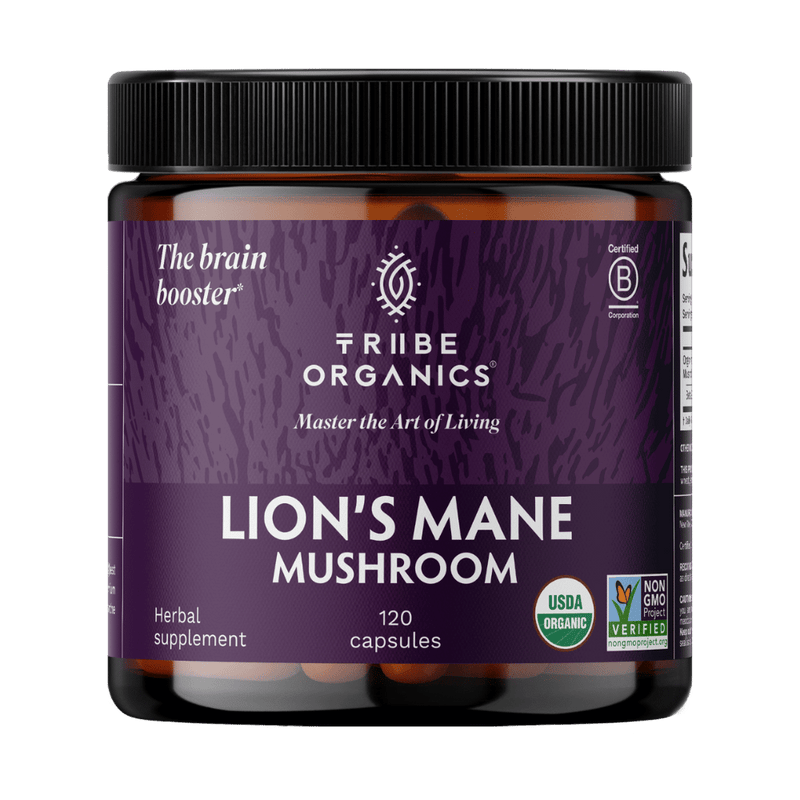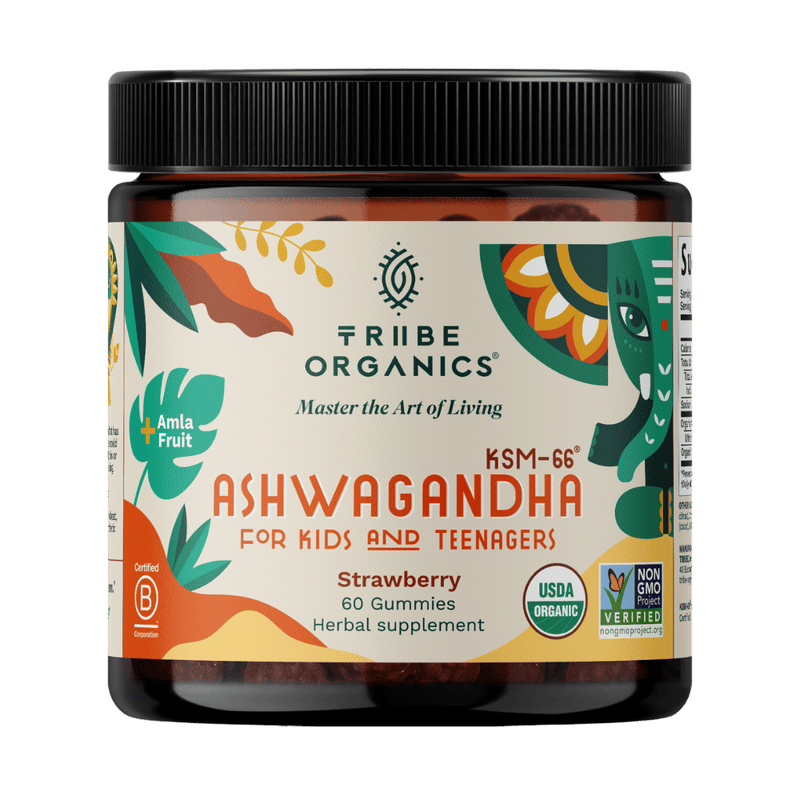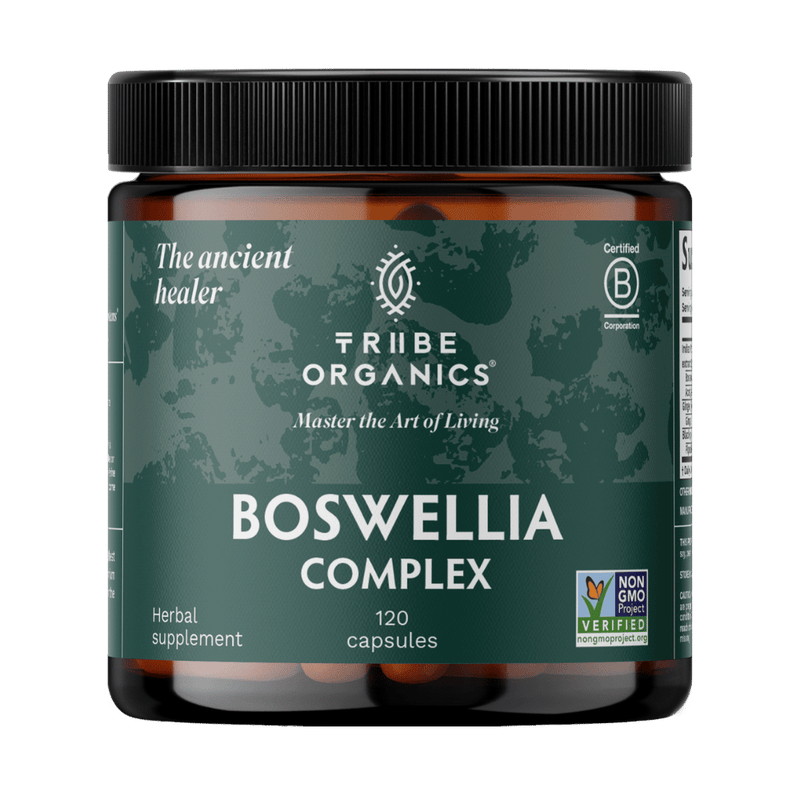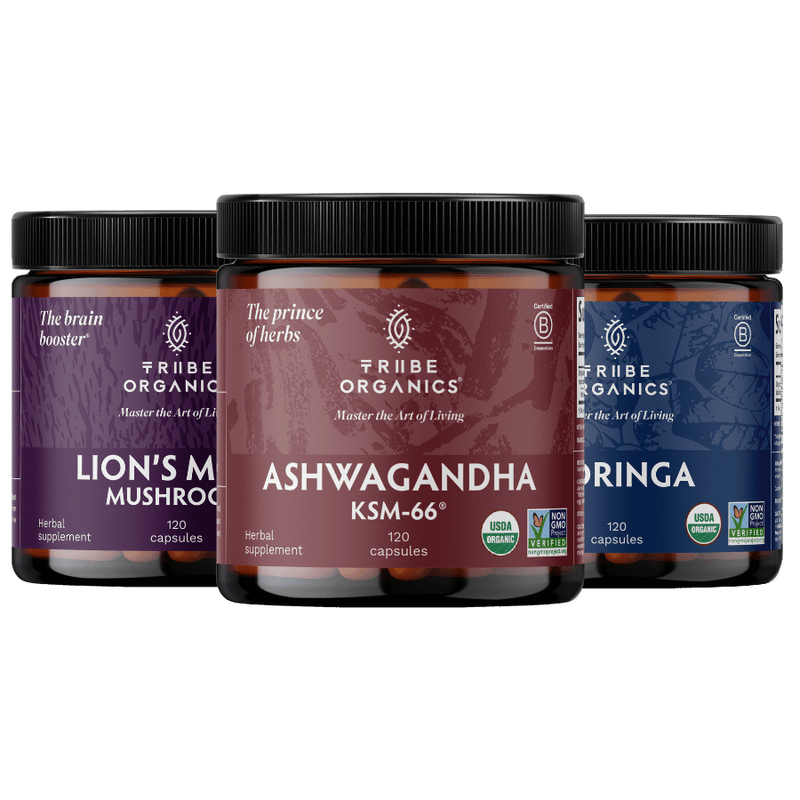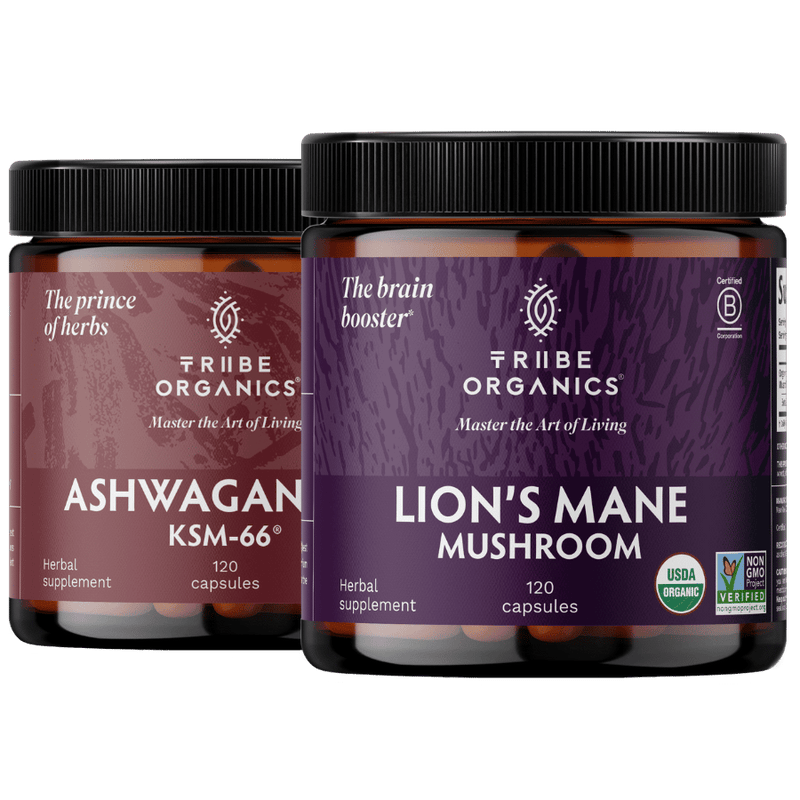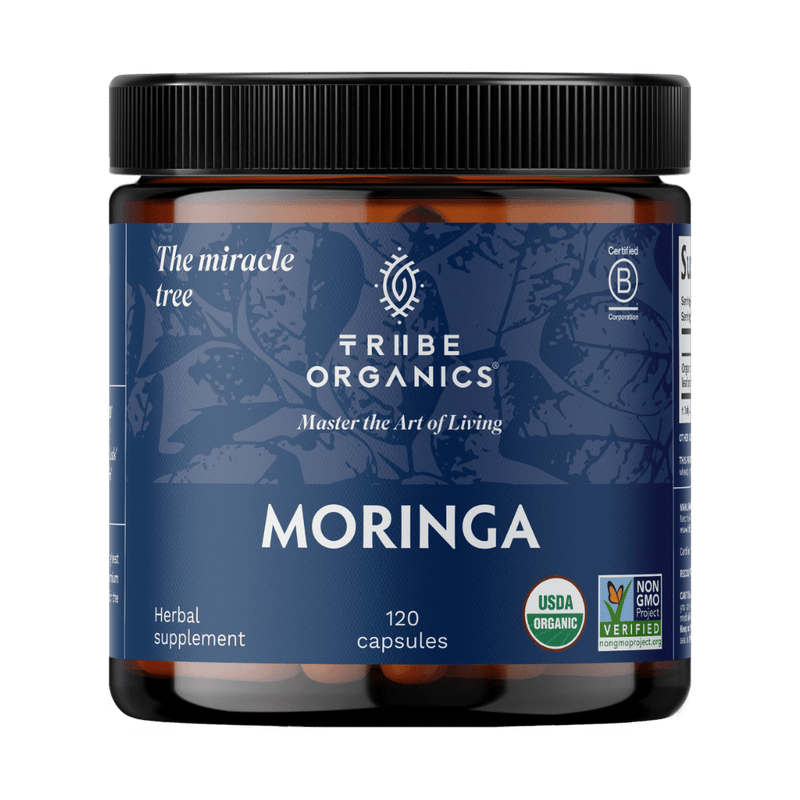Ever feel like stress turns your healthy habits upside down? You reach for sugary treats instead of your usual apple slices, and that nutritious salad suddenly seems less appealing than a plate of comfort food. If this sounds familiar, you're not alone.
Stress can wreak havoc on our relationship with food, triggering cravings and unhealthy eating patterns.
But what if there was a natural way to combat those cravings and regain control? Enter ashwagandha, an ancient herb with the potential to help you break the stress-eating cycle. Read on to learn more about Tribe Organics and how their ashwagandha supplement can help.
Ashwagandha Reduces Stress-Induced Food Cravings: An Herb with Ancient Roots
Ashwagandha, also known as Indian ginseng or winter cherry, is a powerful adaptogen that has been used in Ayurvedic medicine for centuries. Adaptogens are a class of herbs that help the body adapt to stress, promoting overall well-being. Recent research suggests that ashwagandha reduces stress-induced food cravings by regulating cortisol levels.
Cortisol, often referred to as the "stress hormone," can increase when we're feeling overwhelmed. This surge in cortisol can trigger cravings for sugary and fatty foods as the body seeks a quick energy boost. Tribe Organics’ Ashwagandha KSM-66 can help lower cortisol levels, promote a calmer state, and reduce the urge to indulge in unhealthy snacks.
How Does Ashwagandha Work? Unveiling the Science Behind the Herb

While the exact mechanisms of ashwagandha's impact on food cravings are still being explored, several potential pathways are being investigated. Here are some key theories:
- Reduced Cortisol Levels: As mentioned earlier, ashwagandha may help modulate cortisol production, keeping stress hormones in check and mitigating the stress-craving connection.
- Improved Blood Sugar Control: Ashwagandha may improve insulin sensitivity, helping the body regulate blood sugar levels. Stable blood sugar levels can contribute to feelings of satiety and reduce cravings for sugary treats.
- Enhanced Mood and Sleep: Stress can disrupt sleep patterns, leading to fatigue and increased cravings for energy-dense foods. Ashwagandha's potential mood-boosting and sleep-promoting properties may indirectly contribute to reduced cravings by promoting overall well-being.
Beyond Cravings: Unveiling the Weight Management Potential of Ashwagandha
Studies suggest that ashwagandha reduces stress-induced food cravings, which can contribute to weight management efforts. However, it's important to remember that ashwagandha isn't a magic bullet for weight loss. It works best when combined with a healthy diet and regular exercise.
Think of it as a supportive tool that can help you manage stress-related eating and weight and foster a healthier relationship with food.
Understanding Your Cravings: Hunger vs. Emotional Eating
Cravings can be confusing. Sometimes, a genuine hunger pang calls, prompting you to reach for a healthy snack.
But other times, cravings are fueled by emotions, particularly stress. Learning to differentiate between these two can be a game-changer in managing your cravings and developing a mindful relationship with food.
Hunger Pangs vs. Emotional Cravings:
Hunger
Hunger cues come on gradually. You might feel a rumbling stomach, a slight decrease in energy, or a general sense of needing nourishment. Hunger is often satisfied by a variety of healthy, balanced options, and the craving diminishes after eating.
Emotional Eating
Emotional cravings hit you suddenly and intensely. They're often linked to specific emotions like stress, boredom, or sadness. These cravings typically have a strong pull towards sugary, fatty, or comforting foods and may not be fully satisfied by eating.
Mindful Eating: Breaking the Craving Cycle
The good news is that you can develop strategies to manage emotional cravings and make healthier choices. Here are some tips to get you started:
- Identify Your Triggers: Pay attention to situations or emotions that trigger your cravings. Is it after a stressful workday? When you're feeling lonely? Recognizing your triggers can help you develop coping mechanisms.
- Practice Mindfulness: Before reaching for food, take a moment to pause and check in with yourself. Are you truly hungry, or is an emotion driving the craving? Mindfulness can help you make conscious choices about your eating.
- Healthy Alternatives: Stock your pantry with healthy snacks you enjoy. When a craving hits, you'll be ready with a satisfying option that won't derail your health goals.
- Seek Support: Consider talking to a nutritionist or therapist to develop personalized strategies for managing stress and emotional eating.
Ashwagandha and a Holistic Approach
Ashwagandha can be a valuable tool for managing stress-induced cravings. However, it's important to remember that a holistic approach is key.
Here's how you can combine ashwagandha with other strategies for optimal results:
Prioritize Sleep
Aim for 7-8 hours of quality sleep each night. Sleep deprivation can disrupt hormones that regulate appetite, increasing cravings.
Manage Stress
Develop healthy stress-management techniques, such as yoga, meditation, or spending time in nature. Reducing overall stress can lessen the impact of stress-induced cravings.
Stay Hydrated
Dehydration can sometimes be misinterpreted as hunger. Drinking plenty of water throughout the day can help curb cravings and promote feelings of satiety.
Regular Exercise
Physical activity is a great stress reliever and can help regulate blood sugar levels, reducing cravings for sugary foods.
Ashwagandha Reduces Stress-Induced Food Cravings: Unveiling the Underlying Mechanisms
While the exact science behind ashwagandha's effectiveness in curbing cravings is still evolving, researchers have identified several potential mechanisms at play. Here's a deeper dive into some of the key theories:
Regulation of the HPA Axis
The hypothalamic-pituitary-adrenal (HPA) axis is a complex system that governs the body's stress response. When we're stressed, the hypothalamus releases a hormone called CRH (corticotropin-releasing hormone), stimulating the pituitary gland to produce ACTH (adrenocorticotropic hormone).
ACTH then signals the adrenal glands to release cortisol, the primary stress hormone. Chronic stress can lead to an overactive HPA axis and elevated cortisol levels. Studies suggest that ashwagandha may help regulate the HPA axis, preventing cortisol from reaching excessively high levels and mitigating its influence on food cravings, leading to healthy weight management.
Impact on Neurotransmitters
Neurotransmitters are chemical messengers in the brain that influence mood, appetite, and reward processing. Certain neurotransmitters, like dopamine and serotonin, can play a role in cravings.
Ashwagandha may influence the levels or activity of these neurotransmitters, promoting feelings of calmness and reducing the urge to seek comfort in sugary or fatty foods.
Improved Gut Health
A growing body of research suggests a strong connection between gut health and overall well-being, including appetite regulation. The gut microbiome, the community of microorganisms in your digestive system, can influence the production of hormones that impact hunger and satiety.
Ashwagandha may possess prebiotic properties, potentially promoting the growth of beneficial bacteria in the gut and contributing to a healthier gut environment, which could indirectly influence cravings.
Embrace a More Balanced You with Tribe Organics

Feeling stressed and out of control of your cravings? At Tribe Organics, we believe in harnessing the power of nature's wisdom to promote holistic wellness. Our rigorously tested ashwagandha supplements can help you manage stress and cultivate a calmer, craving-free you.
Shop at Tribe Organics today and explore a world of natural solutions! We offer high-quality supplements alongside a wealth of resources on stress management, mindful eating, and natural health practices.
Take control of your health and join our supportive community – contact Tribe Organics and unlock a healthier, happier you!
The Takeaway: Ashwagandha and a Sustainable Approach to Cravings
Ashwagandha offers a promising natural approach to managing stress-induced food cravings, which can help with weight management. By incorporating ashwagandha into your wellness routine alongside other healthy habits, you can create a sustainable approach to managing cravings and fostering a healthier relationship with food.
Remember, it's not about eliminating cravings altogether but about developing mindful strategies to respond to them in a way that supports your well-being.
Shop best sellers
Explore our collection of favorite items that have gained popularity for their quality and satisfaction.



